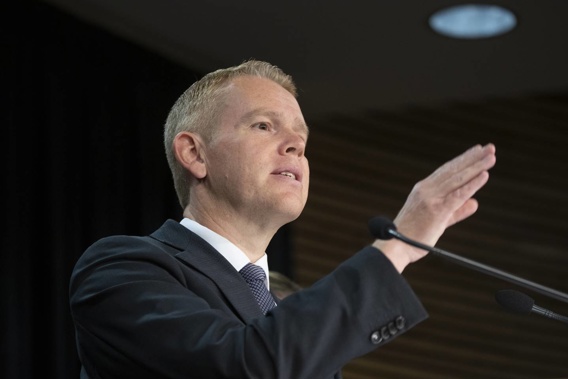
Prime Minister Chris Hipkins says he admires the entrepreneurship of the Christchurch company which offered agriculture help to Ukraine but ultimately New Zealand had processes on how aid is delivered.
New documents released to the Herald under the Official Information Act show how a direct request from the Ukrainian Minister of Agriculture and Food, Mykola Solskyi, for high-speed and mobile grain stackers from MHM Automation was declined.
Hipkins told Newstalk ZB’s Mike Hosking that to his understanding the Kiwi company had approached the Ukrainian Government who then accepted the offer for the grain stackers. The company then approached the New Zealand Government requesting funding.
“That isn’t the way we deliver international aid, if the Ukrainian Government ask New Zealand for something then of course we have processes on how we can best support that,” he said.
Hipkins said obligation could not be put on the Government to fund assistance to Ukraine which had been offered through only a company.
Hipkins told Breakfast he was concerned when he read NZ Herald article about the Ukrainian government’s request for agricultural help from the Christchurch company.
”It is characterised as incorrect. I was concerned by that when I read it.”
Hipkins reiterated that the request was entrepreneurial where the company had offered to help the Ukrainian government and told them they would ask the New Zealand government to pay for it.
So far the request has been for military and humanitarian aid.
”We can’t start writing cheques,” said Hipkins.
The desperate plea from the besieged Ukrainian Government to the agri-business company for specialist help for the 2023 grain harvest was blocked by Foreign Minister Nanaia Mahuta.
By May 16 last year, when Solskyi approached Christchurch-based MHM Automation, which builds huge, high-tech grain stacking machines that help in the storage and handling of bulk grain and wheat, Russia’s aggression had knocked out 15 million tonnes of the country’s grain storage capacity.
Farmers and officials in Ukraine, which has earned the moniker “the breadbasket of Europe” and is one of the world’s top grain producers, feared it would result in grain spoiling and potential famine in the vast traditional markets of Africa and Asia.
/cloudfront-ap-southeast-2.images.arcpublishing.com/nzme/WXTSDHVQ6JB4JDQLT2PZRGKDLI.jpg)
A grain factory on the outskirts of Lviv, Ukraine. Photo / The New York Times
The Ukraine Government was calling for help and in a second letter on June 1 made a specific aid request to MHM Automation for 10 grain stackers by May 2023 in advance of this year’s harvest.
They hoped that the transportable 4WD, two-wheel-steer conveyor-belt machines, which are designed to unload wheat at a rate of 500 tonnes per hour, could quickly help save the country’s grain in bunkers.
The long-established NZX-listed Christchurch-headquartered company, which exports the technology around the world but predominantly to Australia, quickly got an urgent proposal for aid funding together and sent it directly to the Foreign Minister Mahuta, as well as its local MP Megan Woods.
Mahuta declined the application, saying the Ministry of Foreign Affairs and Trade (MFAT) does not currently have a development co-operation programme for Ukraine and “at this stage the Government’s focus is on humanitarian assistance to meet immediate needs, and responding to Ukraine’s requests for military equipment in defence of its sovereignty and territorial integrity”.
She closed by saying: “I acknowledge that this news will come as a disappointment. I wish you well in your efforts to assist Ukraine.”
Take your Radio, Podcasts and Music with you









